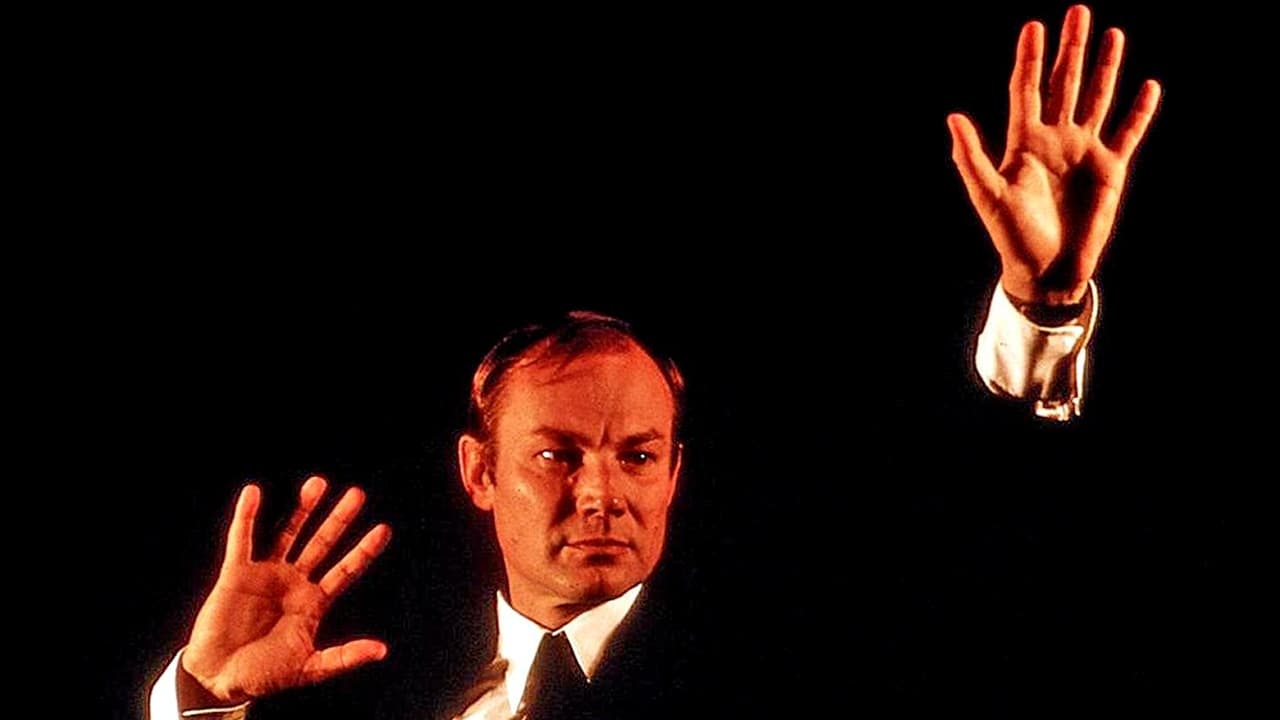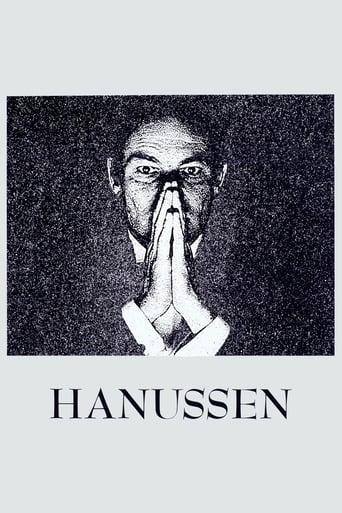

SERIOUSLY. This is what the crap Hollywood still puts out?
... View MorePlot so thin, it passes unnoticed.
... View MoreNice effects though.
... View MoreThe movie's not perfect, but it sticks the landing of its message. It was engaging - thrilling at times - and I personally thought it was a great time.
... View MoreHanussen" is the third and final cooperation between director Istvan Szabo and Klaus-Maria Brandauer and in my personal opinion, the most underrated of this semi-trilogy."Hanussen" tells the (partially fictionalized) story of the historic hypnotizer and clairvoyant Jan-Erik Hanussen. However, Szabo has taken the liberty to change the characters background. Here, Hanussen was born Klaus Schneider, a veteran of WW1, who has gained hypnotic power and the gift of clairvoyance after suffering a head injury on the battleground. With those powers, Schneider changes his name to Hanussen, becoming one of the most celebrated magicians in pre-Nazi Germany. As the Nazi party rises to power, so does Hanussens fame and reputation. Eventually (and inevitably) Hanussen comes to the attention of the Nazis who soon use him as a tool and finally, having outlived his usefulness, discard him.For the third time Brandauer plays a character that wishes for more than what he perceives himself as: the self-loathing officer "Oberst Redl", who's ashamed of his ethic background and sexuality; the brilliant actor in "Mephisto" who tries to camouflage his lower class background and egomania – in "Hanussen" Brandauer shows us a character who wishes he was the superior, omnipotent magician he portrays on stage but, in essence, remains a frightened, wounded victim of the battlefield. Brandauers performance is magic in the truest sense; his presence fills the screen in a way that few actors do (to mind come actors like Klaus Kinski or Al Pacino).Brandauers brilliant performance aside, Szabo wants to teach us a lesson about the fickle nature of humanity, where self-perception, make-belief and reality are often very different, even incompatible, yet inseparable. And more important than the psychological implications, how those fickle traits can be exploited by (in this case) fascism, communism, capitalism or any other ambitious political movement you could name.A powerful, important piece of work with a timeless message; well deserving, despite any technical or dramaturgical flaws, 8 points from 10.
... View MoreHaving seen the two first films of Szabo-Brandauer's trilogy, I felt exceptionally curious to see HANUSSEN, perhaps the least popular of these but very attractive as for the content. And when I at last got an opportunity to see this film, I immediately noticed the mature Szabo directing style that seems to be addressed rather to adult viewers. What is so special about this very style that is ever present in MEPHISTO, OBERST REDL and here? It's almost deprived of effective visuals being supplied with the typical themes concerning the fear of future, contradictions of a self, nonsense of politics, problem of selfishness, power of propaganda, finally a personal tragedy in a diversely brutal world. Yet, there is something that appears to be unique for HANUSSEN...the main character.Though Klaus Schneider or Eric Jan Hanussen (Klaus Maria Brandauer) also goes through an individual drama, he is different than Mephisto or Redl were. He is not an actor whom people like for talent and wit, he is not a soldier whom the military and governing powers reward, he is a magician, a hypnotist, a "prophet" who can predict everything, who is able to look at people's faces and read their minds. Yet, like with the two previous characters, at the moment he becomes a popular figure the politics steps in and controls the life of the character no matter if he wants this or not...Since the film has much to do with magic and unreal events combined with hypnosis, the events might seem unconvincing for many of us. Transfer of will, oriental elements, hidden power, symbols of magic...these all do not appeal to me whatsoever. At the same time, this film is not for youngsters or children but only for adult viewers due to its sophistication and immorality, including nudity. However, what we get at the beginning and at the end of the movie is the Lord's Prayer. It seems that only in the most important, crucial moments of life, people turn to the only God they have in their hearts. However, someone may cope with one significant dilemma: can we combine Christianity with magic? The director does not seem to bother answering for that question. He rather focuses, like in his previous films, on a person in the world, on a life among many lives: so unique, so irreplaceable, so much filled with contradictions, so weak and unstable. And that is something I'd like to analyze in more details.Istvan Szabo, to the very core, provides us with an insight into the sadness, hypocrisy of the reality we live in. Why are the people so much into magic? Because they have unstable lives. Magic attracts them because it may tell them something they do not find in a regular routine of everyday life. They love Hanussen because it is him who predicts the unexpected stock exchange prices of cotton, it is him who tells the fate of the American ship, it is him who predicts the reign of Hitler and his pack of bandits. Finally, it is him, this time so uncomfortable, who predicts the burning of Reichstag. Therefore, illusively, people love him in spite of the fact that there is also a propaganda around his personality; they love him because he can partly ease their fear of tomorrow, he can give them an answer while the rest of the world remains mute.The performances are fine but one performance is a marvel...it's Klaus Maria Brandauer's. I am not going to compare his portrayal to his previous ones in Szabo's films. They were all very good. However, one fact has to be mentioned. It is in HANUSSEN where one realizes that Brandauer was really born for these roles. His Hanussen is a quintessential of what Szabo wanted to convey in his films. He reaches the climax here. Unforgettable moments! Consider, for instance, one of his most powerful moments when he (Klaus Schneider) stops a patient in hospital from suicide. This is also a critical moment in the whole movie because then the main character finds himself as a hypnotist and people find this talent in him. Other cast include Erland Josephson as Dr Bettelheim and Adrianna Biedrzynska as Wally. Meaningful that Szabo twice cast a Polish actress as the main character's woman (Krystyna Janda in MEPHISTO and Adrianna Biedrzynska here). She is not Janda but does a fine job, too.All in all, HANUSSEN, though a very difficult movie, appears to be a significant work: thought provoking, individual one. Yet, it should be seen after MEPHISTO and OBERST REDL. Then, the movie makes the desirable sense. It is simply a harmony of Szabo's with Klaus Maria Brandauer in the lead and their pretty pessimistic message about life and reality.
... View MoreBiography movies take famous people lives, process, embellish and make them more interesting. Something different seems to happen with Istvan Szabo's 'Hanussen' - though it does have its doze of processing I have the feeling that the real life of the character was more interesting than the life in the movie.Eric Jan Hanussen was the stage name of a magician in Berlin's 20s and early 30s. His show were not based on special effects, but on an extraordinary capacity of guessing the thoughts, controlling the minds and foreseeing the future of the people in the audience. We can debate to what extent this was real or con art, but there was something true in his charismatic presence and his power of hypnosis. Janussen however remained in history not by his talent as a magician and not even as a hipnotizer, but because he was capable to predict and express in the language of the magicians the ascension to power of Hitler. What now is history trivia was not that obvious in the 20s and beginning of the 30s and the power of prediction of Hanussen was beyond the general level, reaching the level of detail of the fire that destroyed the Reichstag.Istavan Szabo film goes however far away from the real Hanussen. A visit on the site of the family http://www.steinschneider.com/biography/hanussen_bio.htm reveals a character even more mysterious and fascinating than in the movie. In reality Hanussen was Jewish, but this fact was not known to his Nazi friends. It is not clear whether he was driven by opportunistic reasons or by fear, or by a combination of both, but the real Janussen seems to have been far from the unwilling person, or even opponent as described in the movie, but may have been rather a real sympathizer. It is even said that he even met Hitler, and taught him some crowd control and staging techniques used later by the dictator in his big mass shows. Hard to say why all these details were not presented in the movie, they could have made the character even more complex and interesting.Klaus Maria Brandauer's performance is magnificent, he masters the screen as Hanussen must have mastered the stage, it is maybe the best thing that remained from this film, together with the powerful and colorful rendition of the decadent atmosphere of Berlin during the Weimar Rebublic. Yet the real Hanussen may have been even a more fascinating character than Brandauer's Hanussen.
... View MoreIstván Szabó is one of the best directors in Europe. He doesn't use any special effects, only unusual, demanding stories and Europe's best actors. He is an international director but he never forgets that he is actually Hungarian and there are always some Hungarian speaking people in his movies.In "Hanussen" he tells the very gripping story of a man who predicts Hitler's advancement. It was a most interesting film and I was a bit disturbed afterwards because they didn't make it quite clear whether it's based on a true story or not.However, watch this movie. It's also a great performance by Klaus Maria Brandauer.
... View More